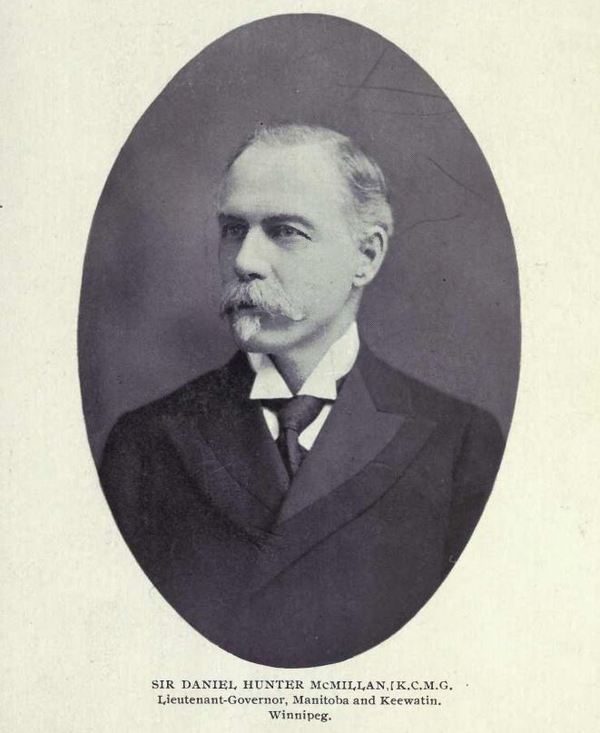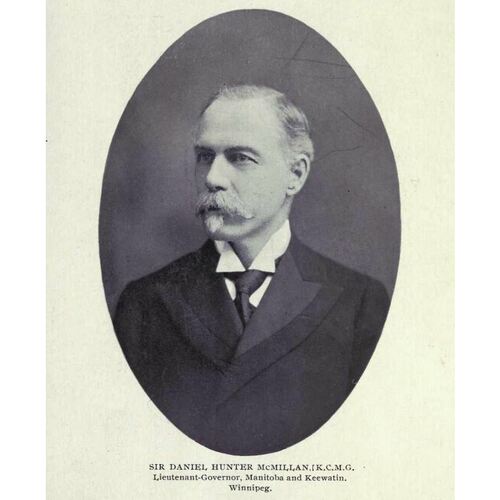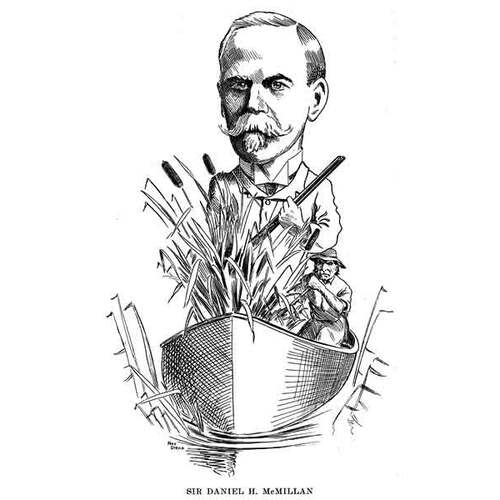
Source: Link
McMILLAN, Sir DANIEL HUNTER, militia officer, businessman, politician, and office holder; b. 14 Jan. 1846 in Whitby, Upper Canada, son of James McMillan and Eleanor (Ellen) Crawford; m. 10 April 1878 Mary Lindsay in Collingwood, Ont., and they had one daughter; d. 14 April 1933 in Winnipeg.
Daniel Hunter McMillan’s father emigrated from Scotland and his mother from County Antrim (Northern Ireland) to Upper Canada, where they settled as farmers. The eldest of three boys and four girls, Daniel received his early schooling in Whitby before the family moved to Collingwood, where he attended the Collingwood Grammar School.
McMillan began his career in the military. His first tour of duty was as a volunteer soldier on the Niagara frontier for a period in 1864 and for four months in 1865. He then enrolled in the Toronto Military School, where he was awarded a first-class military service certificate on 21 May 1866 as a member of the Regimental Division of Simcoe. Less than two weeks later, as Fenians invaded the Niagara peninsula [see Alfred Booker*; John O’Neill*], he joined the 19th Battalion Volunteer Militia Infantry in St Catharines. The unit, which was not involved in the battle at Ridgeway, would soon be renamed the 19th (Lincoln) Battalion of Infantry, and McMillan was awarded a first-class cavalry certificate on 30 July 1867. In 1870 he became the youngest captain in the 1st (Ontario) Battalion of Rifles, mustered to quell the Red River resistance in Manitoba. By the time the soldiers reached the Red River settlement, however, Métis leader Louis Riel* had fled. As a result, the officers and men of McMillan’s unit and the 2nd (Quebec) Battalion of Rifles had little to do, and they spent their time spying out the possibilities of the new land. While some decided to stay in Manitoba, McMillan, with 16 other officers and 83 non-commissioned officers and men, had returned to southern Ontario by 14 July 1871.
Possibly drawn to the new province after his time there with the military, two years later McMillan settled in Winnipeg, where he became active in business and social life. By the fall of 1875 he was treasurer of Prince Rupert’s Lodge of the freemasons. Around this time his brother William Wallace joined him in Winnipeg. Daniel and William’s parents would move to the city in 1881, and their four sisters, with their husbands, would also relocate there over the years. Around the mid 1870s the two brothers formed a partnership with John McKechnie and founded McKechnie, McMillan and Company, proprietor of the Winnipeg Foundry and Machine Shop. As well, Daniel established the Winnipeg City Flour Mills with Samuel Bassett during the same period. Their new steam-powered mill on the west bank of the Red River would provide strong competition for two older facilities. By 1878 McMillan was sole owner of the Winnipeg City Flour Mills, and by 1880 he was no longer a partner in McKechnie, McMillan and Company (his brother William would stay on), which would soon be transformed into Vulcan Iron Works.
McMillan’s flour and feed business naturally led him into the grain trade. By 1878–79 he was a grain dealer. His brother was soon drawn away from Vulcan Iron Works and again went into business with him. They formed D. H. McMillan and Brother, which became D. H. McMillan and Company around 1890. By then the McMillans owned an elevator in Winnipeg with a capacity of 65,000 bushels. D. H. McMillan and Company also had elevators and warehouses in Brandon (35,000 and 6,000 bushels), Alexander (30,000 bushels), and Moose Jaw (Sask.) (7,000 bushels); as well, there was an elevator in Morden, Man. (25,000 bushels) and a warehouse in Qu’Appelle (Sask.) (5,000 bushels). In 1897 the McMillan brothers, along with politician Rodmond Palen Roblin, grain dealer Joseph Harris*, and others, founded the Dominion Elevator Company, described by grain-industry expert Charles W. Anderson as “Manitoba’s second indigenous line elevator company.” With 64 line elevators in 1900, the Dominion company was second only to the Northern Elevator Company Limited, which had 96.
McMillan played a leadership role in the community during his first years there and served as chief engineer of the Winnipeg Fire Brigade, a position he would hold until 1880. In 1879 he launched his political career, running unsuccessfully as an independent in the constituency of Winnipeg during the provincial general election. After the victor, Thomas Scott, won a federal by-election in September 1880 and resigned his seat in the Legislative Assembly, McMillan ran, again as an independent, to replace him and received the majority of votes over his two Conservative-affiliated opponents. He did not stand in the general election on 23 Jan. 1883, perhaps because of the pressure of his other responsibilities. When a grain-and-produce exchange was organized on 13 June, the 16 dealers in attendance chose him as president. This initiative had collapsed by October, however, the 1881–82 economic boom in Manitoba having ended in depression. Four years later Roblin, grain merchant Nicholas Bawlf*, businessman George Frederick Galt*, and Charles Napier Bell (secretary of the Winnipeg Board of Trade) tried again and succeeded in forming a more stable organization. On 24 Nov. 1887 they and eight others elected McMillan president of the Winnipeg Grain and Produce Exchange. Trading formally began on 7 December, and McMillan served as president through 1888.
In 1883 McMillan had once again become active in the Canadian militia within Military District No.10 by helping to organize the 90th (Winnipeg) Battalion of Rifles. He retired from that unit a few months before the North-West rebellion [see Louis Riel] began in March 1885 and became major of a new unit, the 91st Battalion of Infantry (Manitoba Light Infantry). The 91st was later renamed the 95th Battalion of Infantry (Manitoba Grenadiers), and McMillan was promoted lieutenant-colonel in 1887. He would receive his last military appointment in 1904, being named colonel of the 12th (Manitoba) Dragoons.
McMillan returned to politics in 1888, this time as a Liberal, and was elected in Centre Winnipeg when the party and its leader, Thomas Greenway*, were swept to power and formed the first avowedly partisan government in Manitoba’s history. Initially a backbencher, McMillan was called to the provincial treasury after the resignation of Sir Lyman Melvin Jones*, who had been appointed general manager of Harris A., Son and Company Limited. Efforts to break the Canadian Pacific Railway monopoly seriously affected Manitoba politics as Greenway and his colleagues sought to use the Northern Pacific Railroad to reduce freight rates. Their failure led McMillan’s business colleague, Rodmond Roblin, to leave the Liberals and join the Conservative caucus; it also provoked attacks on McMillan by the Manitoba Free Press. Editor William Fisher Luxton*, a former Liberal mla, who was chosen for his vicious style, cast aspersions on McMillan’s character in April 1892, when McMillan denied knowledge of the government’s plan to dismiss a chief clerk from the civil service: “Mr. McMillan has been guilty of another and a very deliberate falsehood, and has proved himself to be unworthy of belief.… He is no better than other people; not half so good as many; just good enough, and no more.” McMillan would have been one of those who were pleased when Luxton lost control of the Free Press in 1893.
In 1889 McMillan did not join the campaign when his political colleagues decided to terminate the denominational school arrangements that dated back to the creation of Manitoba in 1870. The government’s move to a single, publicly funded school system, announced at the beginning of August by the minister of public works, James Allan Smart*, came as a surprise to many, including McMillan. Equally unexpected was Attorney-General Joseph Martin*’s promise a few days later that the government would act on the school issue and, furthermore, it would cease government printing in French. Whatever his feelings about these changes might have been, McMillan remained provincial treasurer as the measures were passed in 1890 [see Thomas Greenway].
During more than a decade of service, McMillan wrestled with the challenges of financing the government through the economic depression of the early 1890s and the slow improvement that began about 1897. The contrast between his cautious responses to Conservative opposition leader Roblin’s questions in February 1890 and his masterful budget speech in February 1899 is striking. During his time as treasurer, expenditures increased substantially, federal subsidies grew even more, and there was a significant surplus at the end of his mandate. Greenway’s Liberals won the general elections of 1892 and 1896, the second time by a greater margin than the first. In 1897, however, Roblin persuaded Hugh John Macdonald*, son of the country’s first prime minister, Sir John A. Macdonald*, to accept the leadership of the provincial Conservatives. In the election of December 1899 he took the party to victory and the Tories began a lengthy time in office.
McMillan found himself in the opposition for only a short time, however, since he was appointed lieutenant governor of Manitoba on 10 Oct. 1900 by Prime Minister Sir Wilfrid Laurier* and sworn in five days later. In addition to his regular duties, he was responsible for entertaining members of the royal family when they visited the province, including the Duke and Duchess of Cornwall during their tour of 1901. Awarded a second term in 1906, McMillan would hold office during the reigns of three monarchs. Created a kcmg on 26 June 1902, he attended the funeral of King Edward VII in 1910 and, the following year, the coronation of George V, who had been his guest nine years earlier.
In 1900 McMillan had become a vice-president of the Canadian Patriotic Fund, created in response to the South African War. During his time in opposition in 1899–1900, McMillan served as president of the St Andrew’s Society in Winnipeg. Soon after being appointed lieutenant governor, he was elected a life member of the local Gaelic Society, part of a global movement encouraging the use of the language. He became a patron of the St Andrew’s Society in 1909 and was elected honorary president in 1930. He was honorary president of the Canadian Forestry Association when it convened in Winnipeg in 1903. His wife and other members of the family had long been associated with Knox Presbyterian Church, and he became a member himself on confession of faith in 1906. He also helped establish the Ninette Sanatorium [see David Alexander Stewart], which opened in 1909, and was one of its trustees. The University of Manitoba recognized his services in 1911 by awarding him an honorary lld.
McMillan valued his position in society and used it, together with his wealth as one of the province’s millionaires, to recognize the achievements of others. He had accepted a one-year appointment as patron of the Manitoba branch of the Royal Caledonian Curling Club [see Robert Henry Dunbar] in 1900 and sponsored the McMillan Cup as a consolation prize from 1894 to 1906. As a patron of the Thistle Curling Club, he offered a “green curler’s” prize in 1903. He appreciated horses, and in 1912 donated the Sir Daniel H. McMillan Cup for the best pair of mares or geldings measuring 15 hands 3 inches and over at the Horse Show in Winnipeg. For the Scottish Amateur Athletic Association he provided the Sir Daniel Hunter McMillan Cup as first prize in the 100-yard dash. To the Winnipeg Swimming Club he presented a shield to be awarded to the best four-member team of Winnipeg schoolboys under age 16. In the 1920s he established the Sir Daniel McMillan Fellowship in History and Political Science at the University of Manitoba.
Throughout his political and vice-regal years, McMillan remained active in business. A founder of the Great-West Life Assurance Company in 1891, he served on the board of directors for the rest of his life and was elected vice-president in 1928. After the Toronto General Trusts Corporation acquired the Winnipeg General Trusts Company in 1902, McMillan joined the company’s Manitoba advisory board. President of the Northern Bank from its founding in 1903, he became president of the Northern Crown Bank following the merger of the Northern and the Crown Bank of Canada in 1908, a position he held until February 1917. In 1911 he was vice-president of the Manitoba and North West Loan Company, the Western Canada Settlers Mutual Company, and the Manitoba Water Power Electrical Company, and by 1917 he had assumed the vice-presidency of the Manitoba and Saskatchewan Coal Company Limited and taken on a directorship in the Canadian Mortgage Investment Company.
Sir Daniel Hunter McMillan died two weeks after a commission reported on John Alexander Machray’s defalcation of funds from the University of Manitoba; the moneys lost included those set aside for a fellowship he had created. The Great Depression did further harm to this legacy. Probate of the estate suggested that much of his wealth was gone by the time of his death at the age of 87 (Lady McMillan had died in 1923). His daughter, Eleanor Isabel, was executrix and spent more than a decade trying to realize the value of his Saskatchewan farmlands and other assets. His mansion at 645 Wellington Crescent, built in 1911–12 in the Elizabethan Revival style, found no buyers, and it was demolished in 1937. However, the building of which he was most proud, the Avenue Block on Portage Avenue in Winnipeg, survived into the 21st century, a reminder of a man who established successful careers in the military, business, and politics, and became a prominent figure in his adopted province of Manitoba.
AM, MG 12, G2 (Daniel Hunter McMillan). AO, RG 80-5-0-76, no.9859. Arch. of the Great-West Life Assurance Company (Winnipeg), ser.52/1 (Company history 1892–1942); ser.52/4 (Company history 1959–69, biographical material, Sir Daniel Hunter McMillan 1846–1933). LAC, R233-30-3, Canada-West, dist. Simcoe, subdist. Collingwood: 1; R233-34-0, Ont., dist. Simcoe north (42), subdist. Collingwood (b): 62. Man., Dept. of Justice, Vital Statistics Agency (Winnipeg), no.1933-016181. Manitoba Free Press, 1875–1928. Winnipeg Telegram, 29 Jan. 1910. C. W. Anderson, Grain: the entrepreneurs (Winnipeg, 1991). F.‑J. Audet, Dictionnaire biographique des gouverneurs, lieutenants-gouverneurs et administrateurs du Canada et de ses provinces, 1604–1921 (2v., n.p., n.d.). Can., Dept. of Militia and Defence, Report on the state of the militia (Ottawa), 1883. Canadian annual rev., 1901, 1911. Canadian men and women of the time (Morgan; 1898 and 1912). Directory, Manitoba, 1876–79, 1890. John Everitt, “The flour milling industry in Manitoba since 1870,” Manitoba Hist. (Winnipeg), no.26 (autumn 1993): 2–14. A. [G.] Levine, The exchange: 100 years of trading grain in Winnipeg (Winnipeg, 1987). J. A. MacDonald, Troublous times in Canada: a history of the Fenian raids of 1866 and 1870 (Toronto, 1910). Man., Legislative Assembly, Journals, 1891, “Sessional papers,” no.1: 176, 180, 185; Sessional papers, 1901, no.6: 210, 216. W. L. Morton, Manitoba: a history (Toronto, 1957). R. R. Rostecki, Crescentwood: a history (Winnipeg, 1993). Hereward Senior, The last invasion of Canada: the Fenian raids, 1866–1870 (Toronto and Oxford, Eng., 1991). Standard dict. of Canadian biog. (Roberts and Tunnell), vol.2. G. F. G. Stanley, Toil & trouble: military expeditions to Red River (Toronto and Oxford, 1989). Bruce Tascona, XII Manitoba Dragoons: a tribute (Winnipeg, 1991).
Cite This Article
A. Ernest Epp, “McMILLAN, Sir DANIEL HUNTER,” in Dictionary of Canadian Biography, vol. 16, University of Toronto/Université Laval, 2003–, accessed February 17, 2026, https://www.biographi.ca/en/bio/mcmillan_daniel_hunter_16E.html.
The citation above shows the format for footnotes and endnotes according to the Chicago manual of style (16th edition). Information to be used in other citation formats:
| Permalink: | https://www.biographi.ca/en/bio/mcmillan_daniel_hunter_16E.html |
| Author of Article: | A. Ernest Epp |
| Title of Article: | McMILLAN, Sir DANIEL HUNTER |
| Publication Name: | Dictionary of Canadian Biography, vol. 16 |
| Publisher: | University of Toronto/Université Laval |
| Year of publication: | 2021 |
| Year of revision: | 2021 |
| Access Date: | February 17, 2026 |




